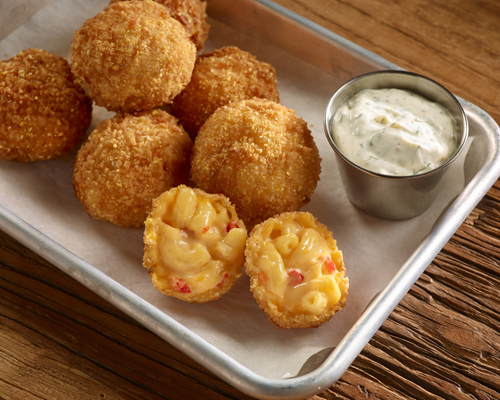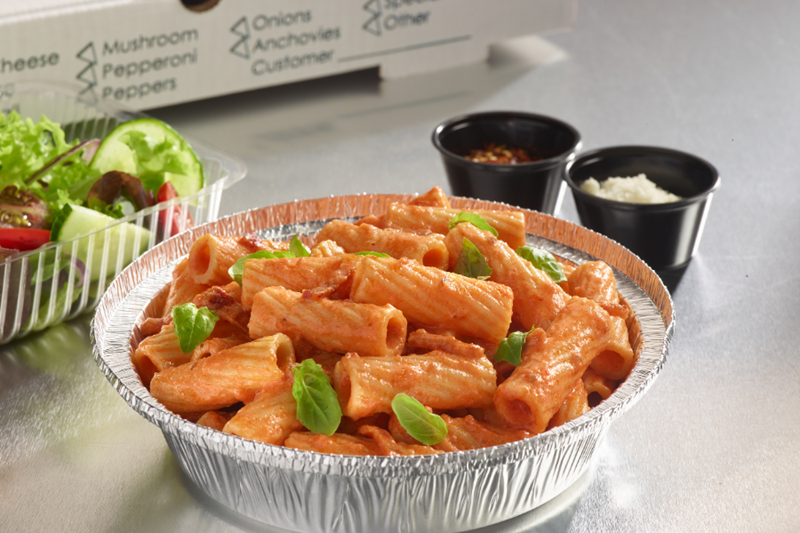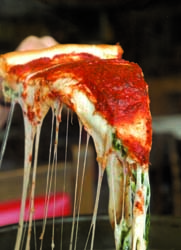Introducing the Players

Doug Ferriman, owner, Crazy Dough’s Pizza, Boston

Kevin Suto, CEO and President, Zachary’s Chicago Pizza, Oakland

Dan Collier, franchisee, Rusty’s Pizza Parlors, Ventura, California

Peg Tomasso, owner, Tomasso’s Pizza & Subs, Boca Raton, Florida

Joe Crowley, owner, Pisa Pizza, Malden, Massachusetts

Chef Jeff Freehof, owner, Garlic Clove Italian Eatery, Evans, Georgia

Scott Anthony, franchisee, Fox’s Pizza Den, Punxsutawney, Pennsylvania
Do you feel like, based on your sales, the recession is nearing its end?
Ferriman: Yes, I do think the recession is slowly improving. We have seen mixed sales at our stores. While one store is up five percent, another is fl at or down two percent. But, all in all, I do believe consumer confidence is coming back.
Suto: I have not seen any indication that the economy is going to recover any time soon. It is tough out there for many businesses and individuals. I base this feeling not necessarily on our sales, but on what I see and hear from individuals in our community and around the country.
Collier: No, I do not believe the recession is nearing the end. Not even close. Yes, my sales are up over last year. However, that is because we adjusted our marketing, did more events and added new marketing for catering. All this effort has led to a 5 percent increase only. In the past two months, two more pizza places and multiple restaurants in our market have gone out of business. I get a call almost weekly from some restaurant owner asking if I’d like their restaurant for pennies on the dollar.
Tomasso: No, because we have found that our customers are still cautious with their money. Our sales have been increasing. Pizza is healthy and affordable for a family. People still want to eat out, or order in, and pizza fits the bill.
Crowley: No. Sales have been great because of our marketing and reinvestment, but our customers are still facing layoffs and financial problems.
Freehof: I am seeing slight increases over last year, but not over two years ago. It’s a good sign, but I wouldn’t come close to calling it ‘near its end.’
Anthony: Yes, but consumers have lost a lot of confidence in the system and are still spending conservatively.
What steps have you taken to battle the recession? What have the results been?
Ferriman: We have stepped up our direct mail campaign, specifically targeting corporate catering as well as residential delivery. The results have been strong due to pizza’s ability to stretch the catering dollar better than other food categories.
Suto: We have been very careful to monitor our costs and to eliminate waste. Most importantly, we work very hard to be the best we can be every day. We are satisfied with the results so far and can thank our loyal customers and committed employee-owners for our longevity and success.
Collier: Our coupon offers were for 10 to 15 percent off. We increased that to 20 percent, on average. We now aggressively market catering, and we doubled the number of off-site events (festivals, schools, sporting tournaments, etc.). We eliminated all ‘mass’ marketing. Excepting door hanging, all print marketing is to our own database. We also cut labor two percent, renegotiated all rents with landlords and renegotiated all bank notes with banks.
Tomasso: We simply continue to do business as always, providing delicious pizza using quality ingredients. Our customers have come to rely on our commitment to excellence and have rewarded us with a stable business.
Crowley: Steps taken to battle the recession include a major remodel and an aggressive marketing campaign. We reinvested over $100,000 on a remodel, using many vendors that I met at International Pizza Expo. Our marketing campaign focused on massive fundraising programs, direct mail, Facebook and theme nights. Results have been a 10 percent increase in sales and great crew morale.
Freehof: We’ve marketed in new and innovative ways. We’ve connected with new customers and focused on catering any event possible, and it has helped keep our heads above water.
Anthony: We have focused on prime costs and community marketing. As for prime cost, even though my sales were down three percent in 2009 versus 2008, my profits still stayed up. I was able to meet the demands of my customers and have no price increases. Community marketing: In this economy, this was a vital step in earning customer loyalty. Especially when competitors are waging price wars, I can still compete on quality.
As a business owner, what’s your primary concern heading into 2011?
Ferriman: My primary concern heading into 2011 is commodity prices, specifically cheese and wheat. One ounce of cheese is 16 cents, so you really must focus on portion control and watch it like a hawk.
Suto: The economy is No. 1. Extreme and sudden cost escalation is always a major concern as well. Health care is out of control, and we all know what happened with cheese, fl our and other commodities not so long ago.
Collier: I believe that the recession will not end until unemployment comes down under 9 percent. We benefit from an employee standpoint since no one leaves because there are no jobs available. But our customers have less money due to layoffs, reduced benefits and reduced hours. The second concern is money to borrow. Tighter bank restrictions mean no money available to borrow to grow.
Tomasso: Politics are killing this country. Republicans and Democrats need to stop this constant ‘going for the throat’ over every issue and work together to find solutions to our problems. We worry about how healthcare initiatives and taxes are going to affect us.
Crowley: My primary headache heading into 2011 is dealing with political issues: Health insurance, increased meals tax, immigration reform, local and state increases in taxes and fees, and changes in local and state fi ling procedures.
Freehof: Finding new ways to grow my business. Thinking about home meal replacement.
Anthony: While I expect my sales volume to go up, I don’t want to forget all I learned from the recession. Never take a good economy for granted. What’s the one critical thing you know now that you wish you knew when you first opened your business?
Ferriman: The one thing I wish I knew when I opened would be how to effectively market my brand. As many small businesses do, we tried everything, but never focused on one or two proven marketing vehicles using one message. Now, we focus on two to three marketing vehicles and just hammer away at them. We target college students through a collegiate promotion book that is distributed throughout the city. We constantly mail menus in a radius around a location, and we also send direct mail pieces to corporations.
Suto: Our business is constantly evolving, and yet we are firmly rooted in the vision set forth by our founders, Zach Zachowski and Barbara Gabel, in 1983. There isn’t really one big thing that stands out as critical information we were lacking in the beginning. We are constantly presented with opportunities to learn as individuals and evolve as a company.
Collier: As I opened more locations, I thought I could continue to wear all the same ‘hats’. As a result, some critical parts of operations did not get enough attention. If I had it to do all over again, I would have promoted an area supervisor when I opened the third location.
Tomasso: Do not skimp on the quality or portions of your product. People will pay for good food. Don’t be afraid to charge for it.
Crowley: I wish I knew back in 1993 that I needed to give up responsibility and trust my key employees. It took many years for me to stop being a worker and start being an owner.
Freehof: That in a recession, everybody is looking for a deal or discount.
Anthony: Making a good pizza is only a fraction of what it takes to have a good pizza business.
What’s your biggest business headache, operationally speaking?
Ferriman: My biggest headache would be running a delivery business in Boston. It is a challenge dealing with traffic and highrise buildings. One of our stores in Boston is located near Fenway Park. Every time there is a game, it is gridlock around the store, which makes it difficult to maintain good delivery times. Another challenge in a city is delivering to the high-rise buildings. When a driver has to go to the 20th floor of a building, he or she could get bogged down, adding an extra 15 minutes to a delivery.
Suto: The unpredictability of the human condition is to me the most diffi cult thing to deal with. We depend on a lot of great people to do what we do, and we are very lucky that our employees are so dedicated and reliable. With a staff as large as ours and providing for as many customers as we do, there is always something that is going to happen with an employee or customer that is out of our control that can create hardship for our business. We deal with these issues as they arise. We do whatever we can to help these people through their difficulties. It can be challenging, but also rewarding at the same time.
Collier: The constant effort to ensure we produce the best pizza in the market. Since we charge more, the pizza must be worth it.
Tomasso: Constantly reinforcing proper procedures with our staff.
Freehof: In times like these, more people use credit cards, which changes cash fl ow and increases costs!
Anthony: Employees’ sense of entitlement and lack of initiative/ motivation. When you find a star employee, do what it takes to keep them.
What has been your most effective form of marketing?
Ferriman: The best form of marketing we have used is direct mail. We are constantly sending mail pieces out to corporations and residents. It is the tried and true form of pizza marketing and always provides the best results.
Suto: Word of mouth, by far. Customers sharing their positive experience at Zachary’s with others has been our most effective form of marketing from the beginning.
Collier: New customers: Door-hanging. Existing delivery customers: Direct mail. Existing dinein customers: 15 percent off business card for next time. Also, online ordering now represents 7 percent of our sales.
Tomasso: Community involvement. Sponsoring youth teams, providing gift certificates, special pricing for youth groups and running special events throughout the year. For example, we began Pizzas for Pencils 15 years ago, where we gather new school supplies to give to needy children. This year we are inviting customers in to make their own pizza — and in exchange we are asking for $10 worth of new school supplies. People have fun and save a few bucks on the cost of a pizza. We help a worthy cause — and people talk about it.
Collier: We use it, but it is not effective at this point. Facebook is designed for personal relationships, not so much for pizza business. All the creative cell phone apps and texting advertising are useless. They have become the new sales people to replace the old print advertising sales people who only serve to distract you from ops. YouTube is probably the most effective of the bunch.
Tomasso: Yes, we do use social media. We launched a Facebook fan page and linked it to our Twitter account, allowing users from both networks to see our updates. We uploaded photos of the pizzeria and staff, and let our fans know of specials and events with daily updates. Occasionally, we offer freebies to customers who mention they are a Facebook fan.
Crowley: We are using Facebook, and it has been incredible. We have over 3,400 fans, and that number is growing every day. We use it to ‘promote’ rather than ‘sell’. We run contests and giveaways and have fun with it.
Freehof: We have a Facebook fanpage. It continues to grow, and now customers are starting to post their favorite things about our restaurant, which we obviously love!
Anthony: While I am not convinced that these forms of media are here to stay (as they will go the way of MySpace), we are giving it a try. We use Facebook. It is a good, inexpensive way to get your message out. But I really don’t see it driving traffic on its own. I view it as an additional way to make an impression on people.
Pepperoni aside, what’s your bestselling pizza? How many of those per week do you sale?
Freehof: “Meat Lovers” is 25 percent of all my specialty pizza sales.
Ferriman: Our best-selling pizza is the potato bacon cheddar sicilian slice: Seasoned red bliss potatoes, smoked bacon, scallions, cheddar cheese and swirl of ranch dressing. It is a favorite among the student population. We sell about 50 a day.
Suto: Our ‘Pride and Joy’ is our spinach and mushroom stuffed pizza. We sell a lot of them. We haven’t taken the time to count how many we sell in a week!
Collier: Tough call since 80 percent of our pizzas have pepperoni. Our BBQ Chicken pizza sells well, along with our signature ‘Rusty’s Special’ (meats and veggies).
Tomasso: Pepperoni is indeed the king. Our second best seller is cheese, which we sell a few hundred of. Sausage is next. We have a local meat market make our Italian sausage, and he uses just enough red pepper for a little kick. One of our specialty pies, ‘The Carnivore,’ made with pepperoni, sausage, meatball and bacon, is popular, too. The aroma of that pie is to die for. Something we have been playing around with lately, we call them ‘Pizza Popovers,’ is gaining fans. We roll up a pizza, cut it into sections and bake in muffin tins. Light, fluffy and different. Something for our customers to talk about.
Crowley: Our best-selling specialty pizza is our buffalo chicken with a bleu cheese base, marinated buffalo chicken, roasted red peppers and our three-cheese blend.
Anthony: Pizza makes up 70 percent of our menu mix per week, and we sell about 700 pizzas a week. Plain cheese pizza has really grown in popularity (thank you, recession). That now accounts for 14 percent of our pizza sales. Pepperoni is 56 percent. Additionally, our gourmet pizzas account for 10 percent of pizza sales. Our ‘Pierogi Pizza’ and the ‘Chicken Rancher’ make up more than half of that (about four percent each).



